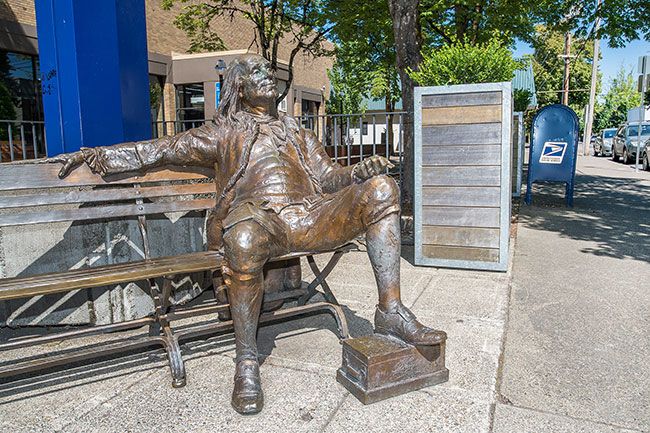MAILED IT! A conversation with the nation's first postmaster general

If the bronze Benjamin Franklin at Third and Davis could get up and walk, he’d need to take only a few steps to mail a letter or a ballot. A blue postal service box stands waiting for his missive, which no doubt would contain some of his trademark wit and wisdom.
The letter box could almost be part of the downtown statue. After all, Franklin was appointed the U.S.’s first postmaster general in 1775. He’s credited with making the service available, speedy and affordable to everyone, not just the wealthy or important.
Franklin, who lived from 1706 to 1790, is credited with numerous accomplishments: He was a Founding Father who signed the Declaration of Independence and the Constitution, writer and printer, diplomat, scientist and an inventor of things such as the Franklin stove (he’s not noted for being humble).
And yes, like most of the Founding Fathers, he owned slaves. His two, King and George, who served him personally, also helped him publish his newspaper — delivered by mail — which contained ads for slave sales.
If his statue could talk, ol’ Ben — proud of his enlightenment and philosophical musings — surely would claim to have changed his mind about slavery. He’s had plenty of time to think about the issue while sitting on that bench, after all, and surely has concluded he really meant “all men” when he signed the document in which Thomas Jefferson wrote “All men are created equal.”
He’s still wrestling with extending “all men” to “all people,” though, which could be why his bronze eyes briefly looked wary when approached by a female newspaper reporter.
Franklin apologized gallantly, however, and attempted to brush dust off the end of the bench, where the reporter — shockingly clad in trousers and short sleeves — would sit.
“I keep forgetting that the fairer sex has made due progress,” he said, statesmanlike. “I believe ladies have been extended the vote, in fact.”
“Women have been voting for president for 100 years, for local offices longer than that here in Oregon,” she informed him.
“Oregon?” he said. “Ah, yes, one of the many states added since my passing. You must forgive me; I missed the Louisiana Purchase, Lewis & Clark, the Great Migration, et cetera, et cetera; the entire 19th and 20th centuries, in fact. I’ve had to learn a great deal since I was sculpted and placed here on that cold day in January of 2009.
“But I’ve been absorbing as much history as I can as I’ve relaxed here on this good, strong bench. Hardly anything escapes me, nor surprises me these days,” he said, flicking another nervous glance at the woman’s clothing. Those trousers!
He muttered to himself a bit of advice he’d printed in Poor Richard’s Almanack, “Search others for their virtues, thyself for thy vices.”
“Excuse me?” the reporter asked.
“Oh, nothing, nothing, nothing,” he harrumphed, recalling yet another piece of his own advice, “Speak little, do much.”
The reporter, unaware that her modest modern attire discomfited the famous statue, asked many questions, including about the politics and postal service of today.
“I’m gratified to see my postal service is still flourishing, and that it remains the key form of communication across our great nation,” Franklin said proudly. “Nothing beats taking quill to paper and producing a profound document that can be posted to persuade another man to one’s own point of view.”
“Well...” the reporter said, hesitating. Should she fill him in about the Internet, about email and Facebook, about cell phones — or telephones at all, for that matter?
She settled for just a sampling of the current debate. “People are wondering whether the post office can handle delivering all the ballots for this year’s presidential election,” she told the man who experienced the first presidential election in 1788-89.
“Ballots? In the mail?” Franklin asked in wonder.
“Some people also wonder if mail ballots will be safe. Might some voters cheat?” the reporter said.
Although it’s been nearly 250 years since he became postmaster general, Franklin quickly defended the U.S. Postal Service.
He said he has no doubt: Brave postal employees will keep the ballots safe and make sure, at all costs, they are delivered.
“I’ve come to know that today’s post office has an unofficial motto, ‘neither rain, nor sleet, nor gloom of night stays these couriers from the swift completion of their appointed rounds,’” the scholar said. “Those words were written by a Greek 2,500 years ago, but they are fitting. I wish they were mine.”
Franklin returned, then, to what he considered the strange concept of voting by mail, rather than gathering at a polling place. Yes, he thought, it was workable and could be fair.
A man — nay, a person — could post a vote from his own home, then return to work quickly instead of traveling several days by horse and buggy.... And what of the man, the person, without a horse?
And yet, he wondered, didn’t Poor Richard’s mention “haste makes waste?” But didn’t it say, as well, “if time be of all things most precious, wasting time must be the greatest prodigality, since lost time is never found again.”
Finally, Franklin said aloud, “must one send one’s ballot by mail? Can’t one walk to the elections’ office to turn it in? I am forever sitting on this bench, but real people still walk, do they not?”
After all, he quipped, as Poor Richard’s Almanack says, “no gains without pains.”
A lively discussion followed.
Finally, the reporter rose to go, Franklin called out one more tidbit from “Poor Richard’s”:
“If you would not be forgotten, as soon as you are dead and rotten, either write things worth reading, or do things worth writing.”













Comments